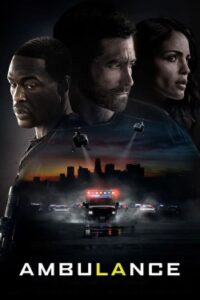
Ambulance
Decorated war veteran Will Sharp is desperate for money because his wife is suffering from cancer and needs urgent experimental surgery that costs more than $230,000. He enlists the help of Danny, his adoptive brother, who, to help him, proposes a $32 million bank robbery, the largest in the history of Los Angeles. But when their escape goes spectacularly wrong, the desperate brothers take an ambulance carrying, hostage, a wounded policeman struggling between life and death and the expert paramedic Cam Thompson.
Michael Bay puts Los Angeles on fire for 24 hours in an unprecedented tense ambulance escape. Also for his cinema, which is wonderfully tinged with melodrama.
Someone thought that complexity didn’t suit Michael Bay and his cinematography all muscles and unreasonableness. All true if we stopped at the superficial patina that the director himself has always loved to spread on his always deeply political cinema. Probably those who have fallen into this misunderstanding will not recover even with this Ambulance, the last chapter of the splendid filmography of Michel Bay who seemed to have said it all with the previous 6 Underground, particularly underestimated perhaps because it was mistaken for a mere Netflix product while instead it was a film all effects ‘experimental’.
Bay’s cinema machine is also this, reflecting on itself, if it helps by self-quoting, perhaps watching (as in this case) with amorous irony Mannian Heat – The challenge, to always add something original to the idea of contemporary entertainment.
In this sense, Ambulance, a (false) remake of the homonymous and mediocre Danish film from 2005 by Laurits Munch-Petersen, intercepts themes and moods to be staged in a thriller that can be adrenaline-pumping and breathtaking one moment before, and the next more serious and composed. In between there is the usual irony exhibited and punctuated by jokes in which one often smiles through clenched teeth.
Of the initial Danish film, which lasted just one hour and twenty minutes, only the idea remains of the escape of two robber brothers in an ambulance with a patient and a nurse inside. Whereas now, Chris Fedak’s adaptation builds a screenplay that fills two and a quarter hours, giving much more space both to the story of the relationship, even conflictual, of the two protagonist brothers, with the flashback on the ex-marine war veteran treated without any regard by society (a theme dear to so much American cinema, think of Rambo), and in the carrying out of the bank heist when the second insistent self-quotation of the film rings out, after the one relating to Sean Connery in The Rock: «Let’s enter together like in Bad Boys?”








